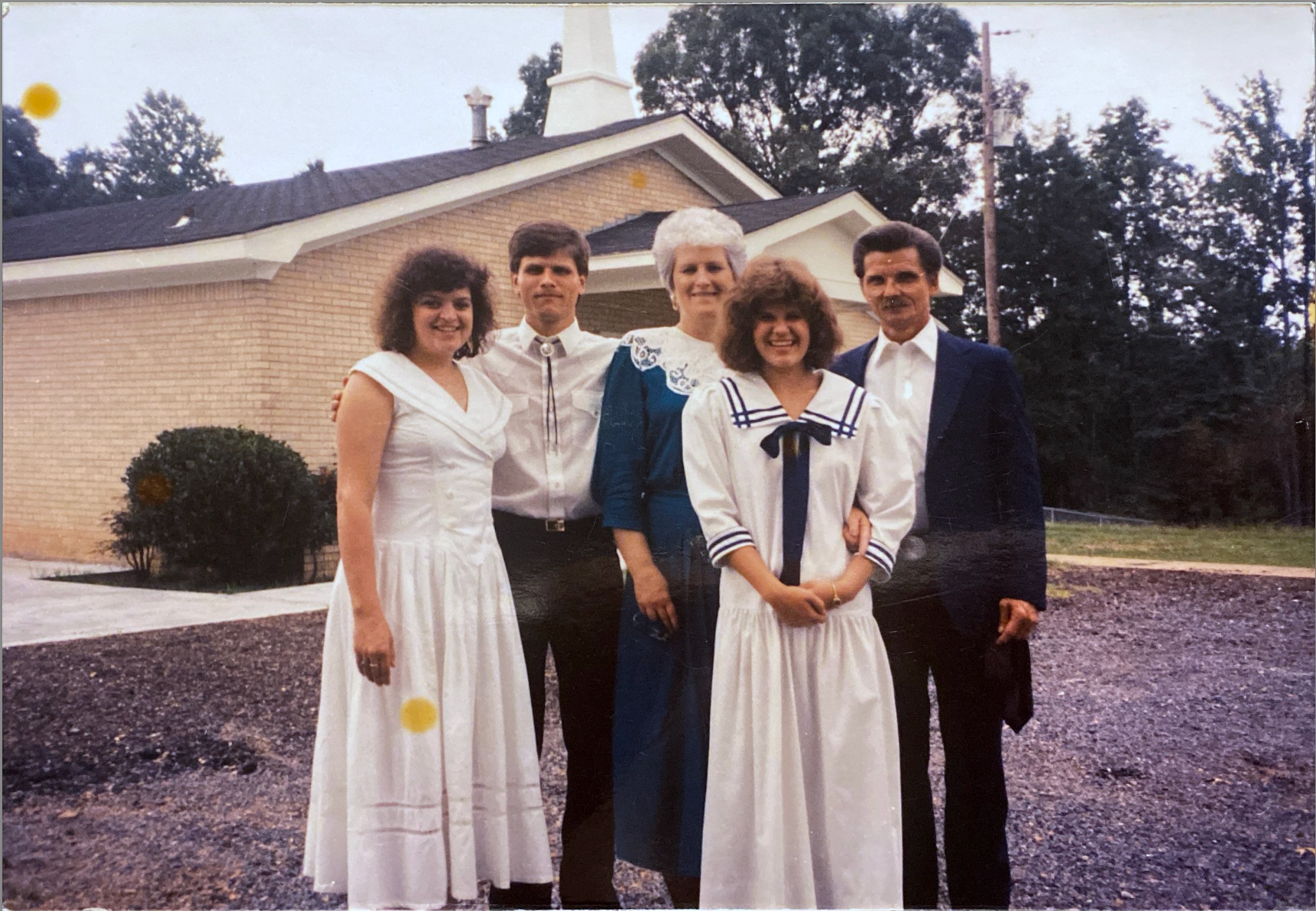The former teen bride and the Republicans who don’t want to outlaw child marriage
‘I’m planning prom and you’re buying a vacuum cleaner,’ Jennifer Brown recalled her best friend telling her after she got married at 16, writes Kelly Rissman


I had just turned 16 in September and I got married in December,” Jennifer Brown says.
Her husband was 23 when they got married in 1992 in Mississippi.
Despite the pair’s glaring age difference — or the fact that she was a child — “no one batted an eye” throughout the marriage process, Brown tells The Independent: not her father, who signed the parental consent form, the pastor, who wed them, or a “single soul” in the county clerk’s office, where they signed the marriage paperwork.
Brown recalls nobody interjecting to say: “Wait a minute. She’s 16. He’s 23. This is actually statutory rape.”
Mississippi marriage law requires boys to be 17 and girls to be 15 to wed — but that age floor can be waived with parental consent and other exemptions, meaning a child of any age could be married.
As shocking as Brown’s experience may be, it is far from rare in the United States.
Child marriage is still legal in 2024 in 37 states. Like Mississippi, three other states – California, New Mexico, and Oklahoma – do not have an absolute age minimum. Nearly 300,000 minors were legally married in the US between 2000 and 2018, according to Unchained At Last, a non profit endeavoring to put an end to the centuries-old practice.
You might think that everyone would support ending child marriage. But actually, Republicans across the country are trying to keep it legal.

In Missouri, where Brown now lives, the state’s legislature tried to pass a bill in February that would prohibit anyone under 18 from getting a marriage license. But Republicans in the state House objected.
Missouri state Rep Hardy Billington explained: “My opinion is that if someone [wants to] get married at 17, and they’re going to have a baby and they cannot get married, then… chances of abortion are extremely high.” The state already bans abortion in nearly all cases.
New Hampshire state Rep Jess Edwards made a similar justification for opposing a child marriage ban in his state. He argued in May that if marriage is restricted to those of “ripe, fertile age and may have pregnancy and a baby involved, are we not, in fact, making abortion a much more desirable alternative when marriage might be the right solution for some freedom-loving couple?”
In other words, extreme conservatives believe that if pregnant children aren’t married off, they might not keep their babies.

Brown became pregnant not long after she married as a teenager. She left the marriage a year and a half later – and, in a desperately sad turn of events, was not granted even partial custody of her son because she was viewed as too young to be a good mother.
The 16-year-old 10th-grader moved in with her new husband right away and dropped out of school one month after the wedding: “Because he didn’t have a high school diploma, so why should I have a high school diploma?”
Still, that same year, she decided to get her GED. Her husband had failed his GED test but Brown passed, which her husband seemed to take as an “affront, I guess, to his masculinity.” Brown quickly learned that her new groom was “very physically, emotionally, verbally abusive.” She estimates she was physically attacked by him once or twice a week, and says she felt “immediate regret” about the wedding.
The pair lived in her husband’s grandmother’s house – where Brown wasn’t allowed to cook or allowed to drive her own car, and didn’t have access to her own money.
For the majority of their marriage, neither Brown nor her husband had a job. While her husband “couldn’t keep” one, Brown would work long enough to receive a few paychecks before he would groan: “‘I’m tired of driving you to work.” So she then “had to quit,” Brown says.
Brown rarely saw her family, since she lived miles from them without access to transportation.
Brown now feels like she missed out on crucial years of her life because she was married off so young. She recalls her best friend telling her at the time: “I don’t have anything in common with you any more. I’m planning prom and you’re buying a vacuum cleaner.”

By July 1994, a year and a half into her marriage and nine months pregnant, Brown visited her brother for a Fourth of July celebration. Although she hadn’t planned on using the holiday as her escape, after feeling the “relief” of being away from her husband, Brown says she decided there and then: “I’m not going back.”
Her decision to leave was not easy: “When you grew up in the South, and you grew up in a Christian household…you don’t divorce – no matter what.” It look leaving the church for her to realize “I have a right to leave an abusive marriage. I have the right to leave.”
Weeks later, Brown gave birth to a baby boy. When she turned 18 in September, she filed for divorce.
Her husband filed for emergency custody of the child. He argued that since “I was still so young, he should have custody.”
“I didn’t have the money to fight,” Brown says. She believed her ex-husband when he said the arrangement was temporary, and would only last until she finished college, which she planned to attend. But that didn’t end up being the case: “I never saw my son again, until he was 17.”
Nick Syrett, author of American Child Bride: A History of Minors and Marriage in the United States, tells The Independent that the link between marriage preventing terminating pregnancies is unfounded: “I know of no study that actually demonstrates that to be true.”
Yet child marriage is not the only controversial vestigial law that Republicans across the country are trying to uphold in the name of family values.
The Comstock Act – an 1873 law originally aimed to promote sexual purity – has re-entered the public eye recently, due to the Trump campaign’s interest. Donald Trump’s running mate JD Vance signed onto a January 2023 letter – along with dozens of other Congress members – urging the Justice Department to enforce the Comstock Act; Supreme Court Justices Clarence Thomas and Samuel Alito even discreetly referenced the 19th-century law in oral arguments over mifepristone.
“It really is a zombie law. It was not enforced after the 1930s” when a series of court cases essentially reclassified contraception as medicine rather than obscenity, Lauren MacIvor Thompson, Assistant Professor of History and Interdisciplinary Studies at Kennesaw State, tells The Independent.
But now “there is considerable interest in what it could do for the anti-abortion movement,” Thompson adds. She warns that laws resembling the Comstock Act also remain on the books at the state level in many places.
In the same vein, Republicans have been trying to resurrect abortion bans since Roe was overturned in 2022. In April, the Arizona Supreme Court upheld a 1864 law, banning nearly all procedures in the state. A month later, after considerable backlash, the state’s legislature narrowly voted to repeal the Civil War-era measure.
In the 1860s and 1870s, states were starting to criminalize abortion – but for very different reasons than seen today. While the “religious tones” to the anti-abortion movement existed back then, Thompson said these “laws were really targeting people that performed abortions that were not trained physicians.”
Around the same time, there was a push to raise the marriage age. Minor marriage “was relatively unremarkable for the first 250 years of American history” – from the 1600s through the mid-1800s, when “people started to protect [children] from adult-like things,” Syrett says.
The laws around abortion and child marriage may have been shifting at the same times in history, but these movements were almost entirely unrelated with one another.

Linking anti-abortion sentiments to uphold child marriage is a “fairly recent argument,” Syrett says.
Mary Ziegler, a law professor at the University of California and expert on the history of abortion, asserts that Republicans are now relying on these zombie laws because they have run out of other options.
“I think primarily they realized after Roe was gone that it’s not going to be possible to get policies that they want enacted through the will of voters,” Ziegler says. For Republicans, she adds, the question then becomes: How to stand by their “longstanding anti-abortion commitments” without the support of voters or Congress?
“Their answer has been through revival laws because they can’t pass new ones,” Ziegler says.
“If they’re still on the books, all they have to do is just start enforcing them,” Thompson warns. “It’s very difficult to map the present onto the past, because the past is a different country. Using history as a justification in these cases is a mistake.”
There is another common thread among these laws: they all came into effect before women had the right to vote – yet they primarily impact women (or girls). From 2000 to 2018, 86 per cent of minors married were girls, according to Unchained At Last.
And some of the impacts are alarming. Correlative studies show that those in child marriages are more likely to get divorced, less likely to finish high school or college, and more likely to be in abusive marriages.
For Brown, even the divorce didn’t extract her from her ex-husband’s torment. He called the restaurant where she worked and began “harassing” her there. He would also call her brother’s home, where she was living, threatening to kill himself – or her.
“I don’t want another girl to experience what I went through at 16. I mean, they deserve to have a childhood,” Brown says today. Now, the 47-year-old has a college degree and two daughters with her second husband, who she has been married to for nearly 30 years.
Regardless of Republicans’ reasoning, Brown said she would ask lawmakers trying to uphold the low marriage floors: “Would you allow your own daughter to get married to some adult man at 16?”






Join our commenting forum
Join thought-provoking conversations, follow other Independent readers and see their replies
Comments